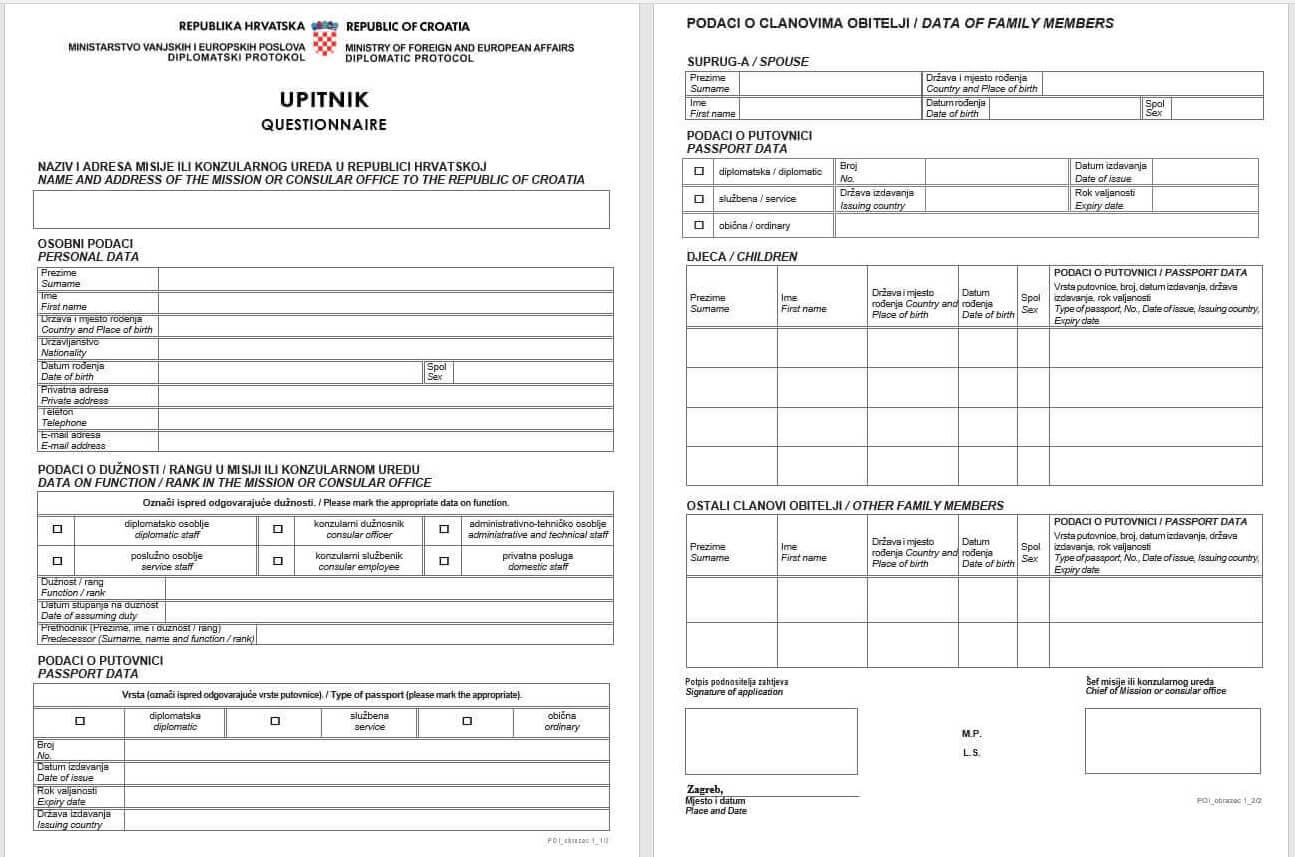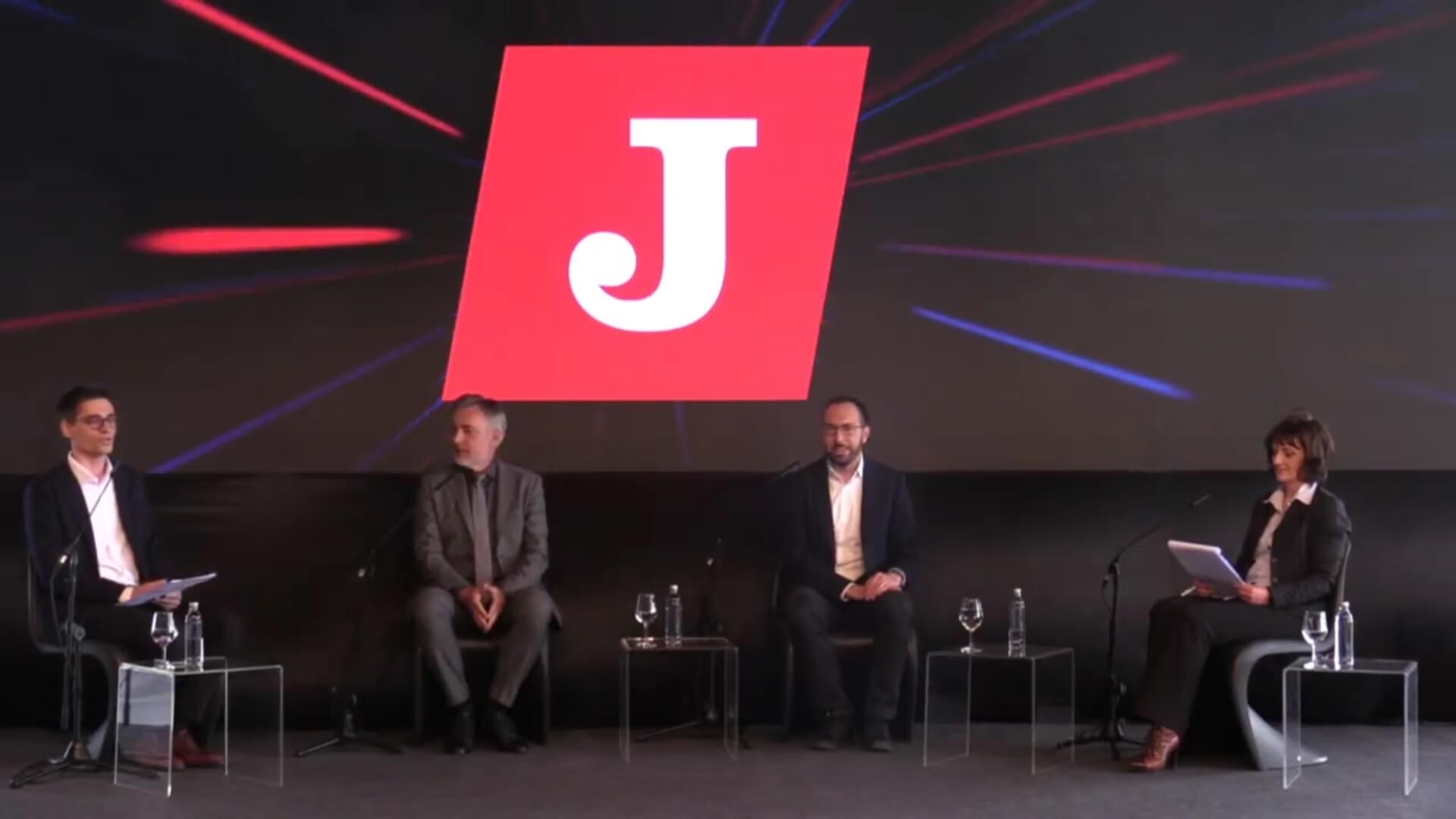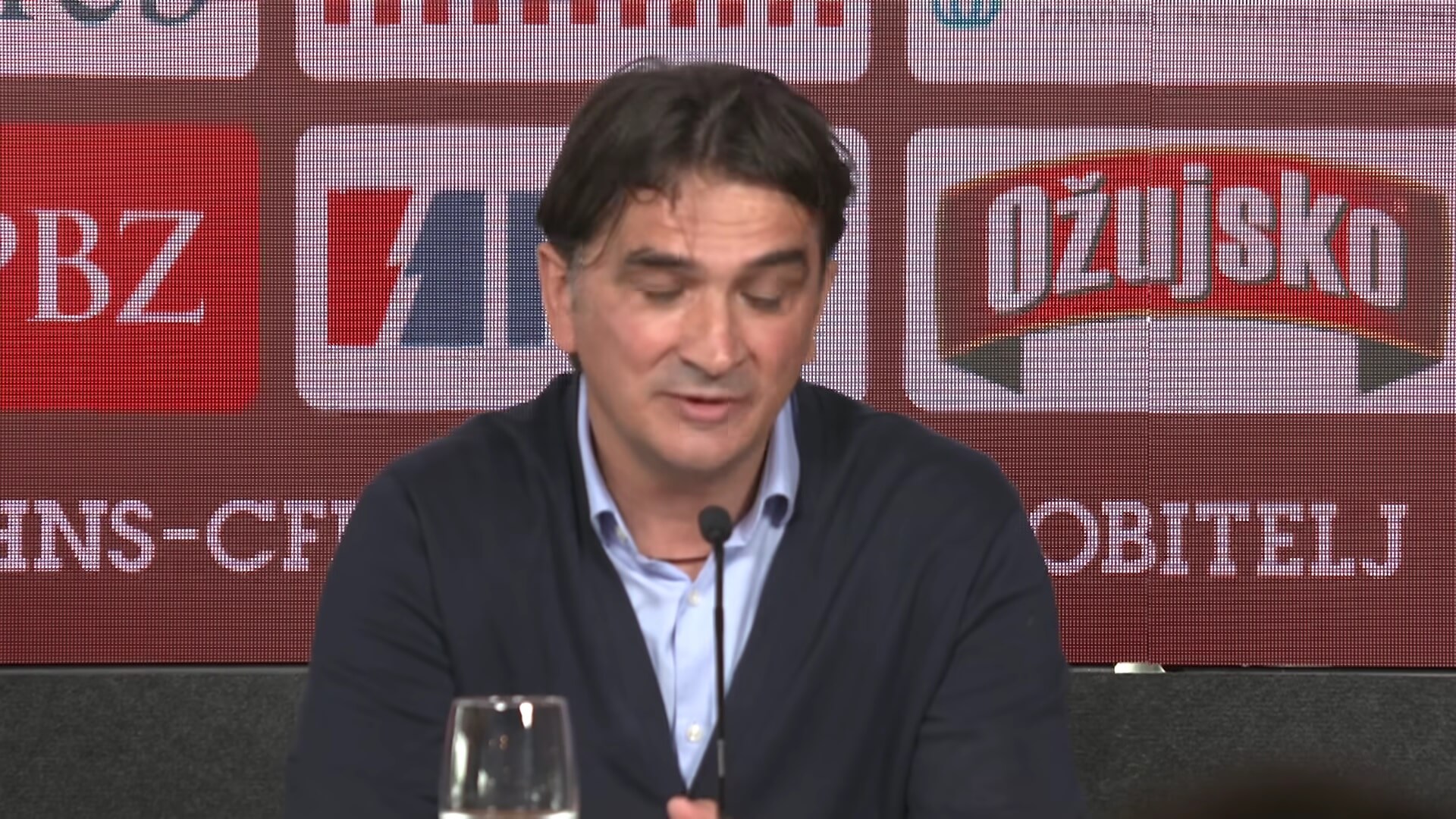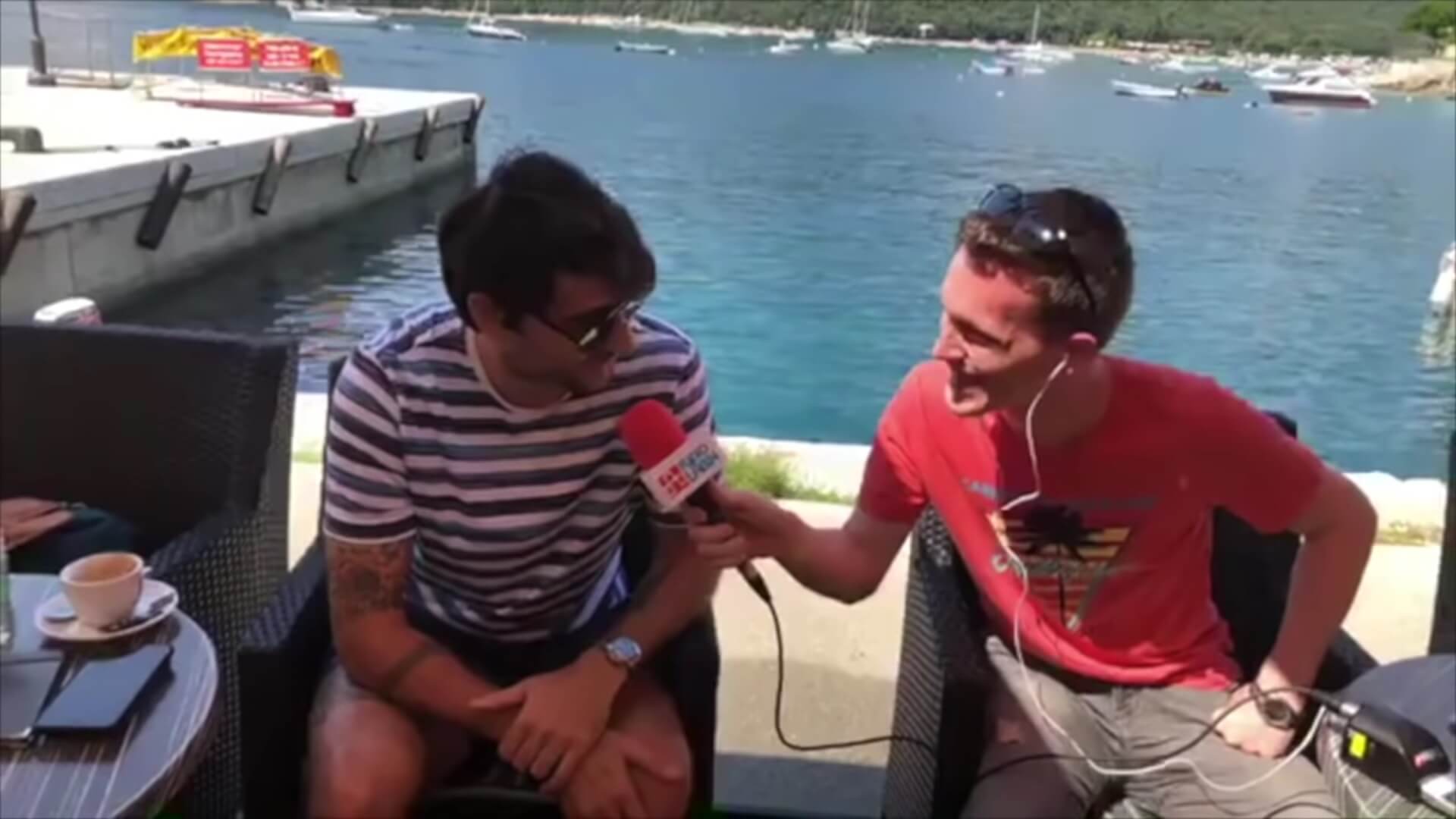Friends of Croatia: Diplomatic Immunity
June 3, 2021 - The seventh article in the series, Friends of Croatia: Diplomatic Immunity brings you more details on diplomatic immunity, its boundaries, and examples of exceptions in accordance with the International Vienna Convention on Diplomatic Relations. Details on how the sentry Ministry of Foreign and European Affairs, are included too.
Being a diplomat isn't bad at all. You get to travel and explore the country you are assigned to, experience the new culture while promoting your own. Additionally, you work on improving bilateral relationships and contributing to the dynamic of the geopolitical scene (hopefully for the better).
Earlier in the series, there was an article dedicated to the key terms of diplomacy. But, there is one more thing that is worth giving special attention to: diplomatic immunity.
You probably might be thinking that means exemption from legal prosecution, and you are kinda right. But that doesn't just mean you can just do whatever you want, and law-abiding behavior is, of course, one of the needed characteristics to fit the job description.
In fact, the International Vienna Convention on Diplomatic Relations from 1961 has very clear instructions.
„The person of a diplomatic agent shall be inviolable. He shall not be liable to any form of arrest or detention. The receiving State (a State in which the diplomat is based) shall treat him with due respect and shall take all appropriate steps to prevent any attack on his person, freedom or dignity“, says article 29 of the Vienna convention. Its also worth adding that the same protection applies for his/her private residence, as well as papers and correspondence, and the diplomatic agent is also not obliged to give evidence as a witness.
But, for not everything to be all benefits and no responsibilities, article 31, despite repeating that „ a diplomatic agent shall enjoy immunity from the criminal jurisdiction of the receiving State and that diplomatic agent „shall also enjoy immunity from its civil and administrative jurisdiction“ – he lists exception. Such as in the event of a real action relating to private immovable property situated in the territory of the receiving State, (unless he holds it on behalf of the sending State for the purposes of the mission) or in the case of an action relating to succession in which the diplomatic agent is involved as executor, administrator, heir or legatee as a private person and not on behalf of the sending State and finally, in the event of an action relating to any professional or commercial activity exercised by the diplomatic agent in the receiving State outside his official functions.
Additionally, „the immunity of a diplomatic agent from the jurisdiction of the receiving State does not exempt him from the jurisdiction of the sending State“.
Ministry at your (diplomatic) service
With the Croatian Ministry of Foreign and European Affairs already stating for this series that they take diplomatic relations very seriously, they respect the convention, and their Diplomatic Protocol Office is here to help. As evident in their protocolar guide, they have an entire section dedicated to privilege and immunity.
„Diplomatic missions and international organizations accredited in the Republic of Croatia notify the Ministry of Foreign and European Affairs, to the Diplomatic protocol arrival of the (diplomatic) mission, attaching the diplomatic note, and the copy of the passport that will be notified“, states the guide in respects to the International Vienna Convention on Diplomatic Relations. The guide adds that when stepping on duty, the Diplomatic protocol will have a view in the passport of a notified person, and it will place a stamp with the following content that will confirm the passport was reviewed by the Ministry. Along with the date and signature to match. This leads to issuing a special identity card that then allows entering the Republic of Croatia without a visa.
„The special ID is issued to the members of missions and consulate offices, members of the UN organizations, and other specialized UN institutions, members of international organizations accredited in the Republic of Croatia, as well as members of their families or members of the shared household and members of private service“, elaborated the guide.
With the aforementioned documents, to get the ID, diplomats must also provide their photos and fill in a questionnaire which can be downloaded from the guide.

Diplomatic protocol questionnaire/screenshot, Total Croatia News
To read more from the series "Friends of Croatia", follow TCN's dedicated page.
For more about diplomacy in Croatia, follow TCN's dedicated page.
Highlights of the Week: 5 Big Events in Croatia from May 17-23, 2021
May 23, 2021 - TCN's highlights of the week. A look at the events in Croatia from May 17 through the selection of TCN's reporter Ivor Kruljac.
From Local elections to released details of the Euro 2020 championship strategy to the release of Zoran Mamić. Add Besana company attempting to boost its position in Croatia, and you have a truly exciting week. Here are the highlights.

screenshot / Jutarnji list
Highlights of the Week: Zagreb mayor candidates Tomašević and Škoro had a debate ahead of the second round of elections
Jutarnji List invited on Friday mayoral candidates Miroslav Škoro (Homeland Movement), and Tomislav Tomašević of the green-left party We Can! to debate ahead of new elections.
In the first round of the elections, We Can! earned 147.631 votes (45.15%), while Homeland Movement had 39.789 votes (12.16%). Before officially entering the second round, Škoro declared Tomašević and We Can! party extreme left and pushed the narrative of elections as an ideological referendum among right-wing and conservative circles. Škoro also accused We Can! of being foreign mercenaries working for a philanthropist George Soros or wanting to revitalize Yugoslavia and Škoro's associate Zlatko Hasanbegović earlier in the week called We Can! a lesbian syndicate. Additionally, Nikola Grmoja (Most Party) stated for N1 that We Can! are Soroshians and accusations of their weird name-calling saw a random generator on the internet designed to mock these terms by random options of name-calling. Meanwhile, Tomašević continued the campaign talking about solutions to the problems Zagreb is currently facing but occasionally makes remark accusations while keeping it clean. The debate on Jutarnji List saw similar rhetoric from both candidates in their public performances, and overall, at least for the people of Zagreb, May 30 can't come soon enough.
screenshot / Hrvatski nogometni savez
Highlights of the Week: Zlatko Dalić announces preliminary EURO 2020 Croatia player list
Coach Zlatko Dalic has announced the preliminary EURO 2020 Croatia player list on Monday. Luka Modrić (Real Madrid), Marcelo Brozović (Inter), Milan Badelj (Genoa), Mateo Kovačić (Chelsea) are some of the names that made it on the list.
The Croatia national team has entered the last month of preparations for the European Championship, which opens on June 13 at Wembley against England at 3 pm.

screenshot / RTL
Highlights of the Week: Zoran Mamić released from custody
Former Dinamo football coach Zoran Mamić will remain free while in Bosnia and Herzegovina; however, he will have to report to the police once a week, and his personal documents have been temporarily confiscated, the court in Bosnia and Herzegovina decided on Wednesday.
Zoran Mamić was arrested early Wednesday morning by officers from the State Investigation and Protection Agency (SIPA) based on an arrest warrant issued against him in Croatia.
After that, Mamić was handed over to the court in Sarajevo. Judge Branko Perić determined his status, including his citizenship of BiH. The judge ruled that Mamić would remain free with precautionary measures and was ordered to give in his personal identification documents.
The court did not discuss the matter of Mamić's extradition, considering that Croatia has not sent a formal request yet.

screenshot / Radio Labin
Highlights of the Week: Former football player Vedran Ćorluka new Croatian assistant coach
The new Croatia national team assistant coach Vedran Ćorluka was officially presented by coach Zlatko Dalić at a press conference in Zagreb ahead of EURO 2020.
Although there was a lot of speculation, Croatian football player Vedran Ćorluka officially announced the end of his playing career and was confirmed as the new Croatia assistant coach on Monday.
"I did not plan it, but the moment has come," said Ćorluka at the press conference at which coach Zlatko Dalić presented the list of players for the upcoming European Championship.

Pixabay
Highlights of the Week: Italian company Besana strengthening position in Croatia
The Italian company Besana, which is otherwise one of the strongest European companies in the production and processing of nuts and dried fruit, is working to further strengthen its position here in Croatia.
As TCN reported on Monday, the Italian company Besana currently has 50 subcontractors located in Croatia, from whom it buys about 100 tonnes of hazelnuts per year. But, much more can be expected if their plans go well.
To learn more about Croatia, have a look at our newly launched TC website.
For more about news in Croatia, follow TCN's dedicated page.
Zoran Mamić Released From Custody, Has to Report to Bosnian Police Once a Week
ZAGREB, 19 May, 2021 - Former Dinamo football coach Zoran Mamić will remain free while in Bosnia and Herzegovina, however, he will have to report to the police once a week and his personal documents have been temporarily confiscated, the court in Bosnia and Herzegovina decided on Wednesday.
Zoran Mamić was arrested early Wednesday morning by officers from the State Investigation and Protection Agency (SIPA) based on an arrest warrant issued against him in Croatia.
After that Mamić was handed over to the court in Sarajevo, Judge Branko Perić determined his status including his citizenship of BiH. The judge ruled that Mamić would remain free with precautionary measures and was ordered to give in his personal identification documents.
The court did not discuss the matter of Mamić's extradition considering that Croatia has not sent a formal request yet.
A Croatian Supreme Court ruling upheld a ruling sentencing Mamić to four years and eight months in prison after being convicted of siphoning money from the Dinamo Football Club.
After that he escaped to BiH and requested that he be allowed to serve his sentence in that country which was rejected. Zagreb County Court then issued an international arrest warrant against him.
For more about politics in Croatia, follow TCN's dedicated page.
Migrant Smuggling Market in Balkans Worth €50 Million
ZAGREB, 11 May, 2021 - The migrant smuggling market in the Western Balkans is worth at least €50 million a year, says a report by the Global Initiative Against Transnational Organised Crime, describing Serbia as an important destination for migrants because it borders with four EU member states.
The report notes that Serbian police have discovered several tunnels, three to seven metres deep and up to 30 metres long, under the wire fence along the Serbia-Hungary border near the Hungarian town of Szeged and village of Ásotthalom and the Serbian village of Kelebija.
The tunnels are considered relatively risky due to the possibility of arrest and the danger of them collapsing. The smugglers' fees range from €500 to 5,000.
This is much less than during the 2015 migrant however statistics show that the regional market for migrant smuggling is still large regardless of attempts to close the so-called Balkan migrant smuggling route, says the Global Initiative, an international network fighting acquisition of illegal gain and crime.
Quoting Voice of America, the Belgrade media reported about the report, which focuses on the flows of people, drugs and money in the Western Balkans.
Using maps and analyses helps identify key entry and exit points for migrant smuggling through six Western Balkan countries, as well as locations that serve as drug smuggling hubs. Not even the COVID-19 pandemic seems to have disrupted illicit flows, says the Global Initiative.
Its report identifies Serbia as an important destination for asylum-seekers and migrants because the country borders with four EU members - Croatia, Hungary, Romania and Bulgaria.
The report quotes data from the UN High Commissioner for Refugees (UNHCR) under which in 2019, 30,216 migrants entered Serbia, almost twice as many as in 2018. The report also quotes data from the Serbian Ministry of the Interior under which in 2020 more than 8,500 migrants were prevented from illegally crossing the Serbian border.
USKOK Indicts Nine Migrant Smugglers
ZAGREB, 27 April, 2021 - The anti-corruption office USKOK has indicted an Afghan national and eight Croatian nationals for smuggling migrants.
The Afghan national, who is the principal defendant in the case, is charged with having organised a ring to smuggle migrants across the Croatian-Slovenian border.
The migrants were charged €600-800 for transport from the Croatian-Bosnian border to the border with Slovenia.
For more about politics in Croatia, follow TCN's dedicated page.
American Film Producer Don Victor Cisternino Ends Up in Remetinec Jail - Jutarnji List daily Reports
ZAGREB, 14 April, 2021 - US actor and producer Don Victor Cisternino has found himself on an international arrest warrant because the United States wants him for fraud of millions of dollars in subsidies for his employees affected by the pandemic, the Jutarnji List daily said on Wednesday.
I was afraid that the new administration under President Joe Biden would prosecute me for this kind of business, even though it was allowed during the Trump administration. That is why I decided to flee to Europe after the election in the US and seek asylum in Russia or some other country. And that's how I came to Croatia where I wanted to seek political asylum, Cisternino was quoted as saying.
The 45-year old actor and producer, known for his episode role in the television series ER, was arrested on an international arrest warrant on Sunday evening when he entered Croatia from Slovenia in a vehicle.
Over the past few years Cisternino has been running his own company, Magnifi Co, providing consulting services in the film and art industry. The state attorney in Orlando, Florida has charged Cisternino with embezzlement of $7.2 million of a state loan for support to companies affected by the coronavirus pandemic.
Cisternino submitted fraudulent details to obtain a jobkeeping loan claiming that his company employed 422 employees, yet it only has two - Cisternino and his wife.
Irregularities were discovered by the tax authorities as Cisternino's tax return noted that all his workers paid the same tax of $3,356. However, due to tax deductions related to the number of children, unemployed spouse and other benefits, taxation varies from employee to employee which then raised suspicion as all 422 workers paid an identical tax amount.
Cisternino has declared that he objects to being extradited to the US. That means that his extradition won't be expedited and the formal extradition procedure will follow, the daily reported.
For more about crime in Croatia, follow TCN's dedicated page.
Why I Will Never Again Report a Crime in Croatia
January 18, 2020 - Croatia is one of the safest countries in Europe with a low crime rate, but here is why I will never again report a crime in Croatia.
As previously reported on TCN, back in 2018, Netflix bought its first-ever Croatian TV series, called The Paper (Novine), a gritty, hard-hitting fictional story of the struggles of the last surviving independent newspaper in Croatia, based in the city of Rijeka. It has been on my list of things to watch for some time, and we finally got down to watch it early this month, quickly devouring the 23 episodes in the first two series, and eagerly awaiting the third.
I thought it was outstanding and highly recommended for those who do not understand why so many people are emigrating from a country which is such a beautiful tourism experience. A great country for a holiday, not so much for full-time living is a common sentiment here (I personally disagree and could not imagine living anywhere else, but not for the first time in my life, I am in the minority).
The Paper covers a Croatia that most people don't see, certainly not our tourist visitors, but as someone who runs a news portal here, it resonated very strongly. The plot centres around the imminent sale of the last independent paper, and its subsequent use for political purposes, a mirror of much of the Croatian media today. It is set against a backdrop of the Croatian presidential campaign, whose two candidates bear more than a passing resemblance to an actual Croatian female president and the mayor of a large Croatian city who pushes the premise of innocent until proven guilty to the limits.
As someone who works in the Croatian media, The Paper really resonated with me. And while I keep away from the really dodgy stuff here, and so have yet to experience the assassinations, car bombs and baseball bat beatings that appear on the show, the unpleasant phone calls, threats, unfinished sentences, and viral stories which remain unpublished are all too familiar.
One theme which came through very strongly in the show - and one of the greatest problems in Croatia - was the corruptness of the judicial system and the law in general. A crime in Croatia might be reported, then go up the food chain until it hits a stumbling block - the criminal is working with someone higher up the police force or legal system. And so the investigation goes dead.
Similarly, a great story, thoroughly researched and destined to be the top story of the day, gets pulled as a political decision to protect the person it will expose. Someone told me years ago that news portals here make more money from the stories that they do not publish that from those that they do. While TCN is not big enough to be in that line of business even if we wanted to be, I can believe it to be true.
But that lack of trust of justice being served if the crime goes against some corrupt interests is just part of the problems with justice here. And of course, Croatia is far from unique in this, but it does seem much more pronounced here. And it is somewhat ironic, as Croatia is - together with Japan - easily the safest country I have lived in.
But back to the main topic, reporting a crime in Croatia.
My dealings with the police over 17 years here have been thankfully very minor apart from getting residence permits. There was that driving incident on Hvar about 15 years ago I would rather not talk about, then the occasion when my 6-year-old daughter insisted on calling the police when someone stole her rucksack and a freshly caught fish from the back seat of our unlocked car after we popped into a shop to buy a birthday present. The policeman said he would look into it, but advised her that we should always lock the car. My daughter is still blaming me for the loss of the rucksack and the fish five years later.
We never did find the fish.
I went to the police myself this week to report my first crime in Croatia. I will not do so again.
My inbox is fruitier than it has ever been, and running TCN has certainly opened my eyes to a new Croatia. Emails exhorting me to investigate extortions, corruption, attempted rape, abuse of migrants, officials abusing power - they all end up in my inbox. Even if I wanted to look into some or all of them, we simply do not have the resources, but one correspondence recently piqued my interest, and I decided to look into it a little as I unusually had some time.
After a little research, we had a story. A really, really good story. A story which I think would make it to all the national portals (at least those who were allowed to publish). It was also a story which was not without danger, and one with a criminal element. Rather than publish the story, I thought it would be more responsible to report the crime to the police, then see if we could make a story once they had investigated. And so I went to report my first crime in Croatia.
My dealings with bureaucracy are limited these days, and I had forgotten the disinterested look of the receptionist as she listened to me explaining what I wanted. I was told to sit in the waiting room, which I did for 5 minutes until a policeman came. Having explained the same thing again to him, there was another 5-minute wait until an inspector came, and I followed him to his office.
"ID card please." Nothing was going to happen until he had established my identity and checked me out on the police database. No chance of an anonymous tip-off then... Had I not been just watching The Paper, I might have been less paranoid, but now I was in the system, the originator of an allegation of a crime which may or may not be connected to someone higher up the investigative food chain. And if there is someone higher up the investigative food chain involved, not only will the crime go uninvestigated, but it will not be hard to figure out who was reporting it in the first place.
The inspector took the details of the alleged crime, looked into it a little from the info I gave him and declared it could be interesting. And that was that. I told him I would be interested in doing a story on it and asked if he could come back to me with any news. Nothing since.
Perhaps the tip-off has been investigated and the criminal arrested. Perhaps the investigation got to a certain level, and an interested party higher up decided to stop the investigation. And start looking into who discovered and reported the crime.
I didn't think I would feel so uncomfortable about doing my civic duty, and I posted on Facebook to see if anyone else had similar experiences. The feedback was interesting, from several who said the police response to petty crime was excellent, to those who felt too intimidated to come forward, or having come forward, the case disappeared. Lack of faith in the system was a common theme in the private messages I received.
Have you reported a crime in Croatia, or were you too afraid to do so? Let us know your experiences on This email address is being protected from spambots. You need JavaScript enabled to view it. Subject Crime.


